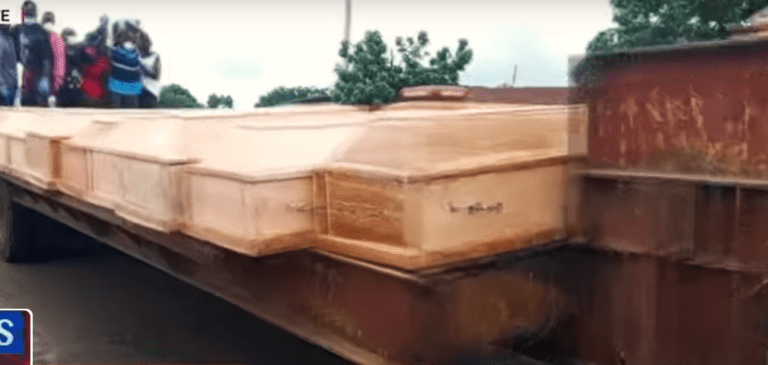On Friday (July 25) residents of Nigeria’s Plateau state held a funeral procession for 27 Christians who were massacred in one village 10 days ago, despite warning of the imminent danger, sources said.
With the crowd, they placed 27 caskets in payloader trucks from Joss’ morgue to their hometown of Bindi (Jebu) village in Lyom county, and held funeral services after the July 15th attack by villagers Fulani Hazman.
The herds attacked the predominantly Christian villages around 11pm when the inhabitants were asleep.
“These are the bodies of innocent Christians who were cruelly and horribly killed in sleep by herdsmen and terrorists of Muslim Fulani Killers from a community less than 200 metres from the Special Task Force (STF), a military checkpoint in the Lyonum Regional Region.” “The fact that this community has noticed and reported an impending attack on STF officers at that military checkpoint makes it even more worrying, doubting and raising many questions.”
He said rather than pose verbal condemnation, the government should prioritize preventing herdsmen’s attacks on Christians and religious genocide.
Regional rights advocate Gideon Manjal argued that the attack was a herdsmen’s ploy aimed at banishing Indigenous Christians from their lands.
“The attack occurred despite the visible presence of security forces in and around the region, including armored forces assets,” Manja said. “The identities and hideouts of these attackers are known to the authorities, but no meaningful actions have been taken to dismantle them.”
Pam Dacheongyang, a parliamentary senator in the area, said the herdsmen went back to the house where they killed elderly people, women and children while they were sleeping.
“Repeated attacks, including previous attacks in Jor and Lim villages, point to deliberate efforts to terrorize and drive away the agricultural community, primarily Christian communities, by Fulani herdsmen,” Dacheongyang said in a reporting statement. “This cycle of unprovoked attacks is the prosecution against security agencies. The situation at Bindi (Jebu) goes beyond tragedy and is in a position to be blamed by everyone.”
“These are people whose main occupation is agriculture, and continuous violence not only destroys lives, but also threatens food security and livelihoods,” Dacheongyang said.
Belom youth leader, Deiyop Solomon, pointed out that Fulani herdsmen burned several homes and many Christians were injured along with the murder of 27 people.
Cholom Gian, a local residette, said the body was taken from the morgue at Joss University Teaching Hospital in Joss. He was killed in the village of Bindi, including 26 Christians, Sarah Badong Bagit, Dorkas Badong Bagit, Nuzen David Musa, Dus Gyan Jok, Jale Pius Davou, Martha David Sunday, Garat David Sunday, Marta David Sunday, Dalyop, Hudaing Gyaus Fondong, Ruda Gyang Fondong, Patience Solomon Sunday, Patience Musa Dalyop, Danlami Tongs Davou, Tabitha Yakubu Shok, Magdalane Yakubu Shok, Patience Yakubu Shok, Bitrus gardaku, dava ngo, dargo, dargo ngo, darkubu ngo, nyou nyou nyoungo ngo ngo, bitrus gard ngo, Bullus, Pam Dan, Esther Paul.
“27 bodies of Christian victims of the July 15 attack of Lyom LGA in Jeb Bindi village by Fulani terrorists were brought to the house on July 25th for the mass burial on July 25th,” confirmed Gyang.
With millions of figures in Nigeria and Sahel, Fulani, primarily Muslim, constitute hundreds of clans of many different lines that do not hold the views of extremists, while some Fulani adhere to radical Islamist ideology, all party parliamentary groups (Appgs) in the UK for international freedom or beliefs.
“They are clearly intent to adopt a comparable strategy for Boko Haram and Iswap and target strong symbols of Christian and Christian identity,” the AppG report said.
Nigerian Christian leaders say they believe herdsmen’s attacks on the Christian community in the mid-zone of Nigeria are inspired by the desire to forcefully take over Islam as it forced Christian lands and made desertification difficult to maintain the flock.
According to Open Doors’ 2025 World Watch List, Nigeria has remained one of the most dangerous places for Christians. According to WWL, of the 4,476 Christians killed for faith around the world during the reporting period, 3,100 (69%) were in Nigeria.
“The scale of anti-Christian violence in this country is already at the highest possible level under the global watch list methodology,” the report states.
In the north-central zone of the country, where Christians are more common than they are in the northeast and northwest, Islamic extremist Fulani militias attack farm communities, killing hundreds of Christians and, above all, hundreds of Christians. Jihadist groups such as Boko Haram and the Islamic State (ISWAP) of West African states are also active in northern states in the country where federal control is poor and Christians and their communities continue to be targeted for attacks, sexual violence and the killing of disability. Ransom aid has been increasing significantly in recent years.
The violence spreads across southern states, with new jihadist terrorist group Lakrawa appearing in the northwest, armed with sophisticated weapons and an extremist agenda, WWL noted. Lakrawa is affiliated with the expansionist al-Qaeda rebellion Jamaa Nusrat ul Islam Wa al-Muslimin, or Zinim, which is derived from Mali.
Nigeria ranked 7th in the 2025 WWL list of 50 worst countries for Christians.
